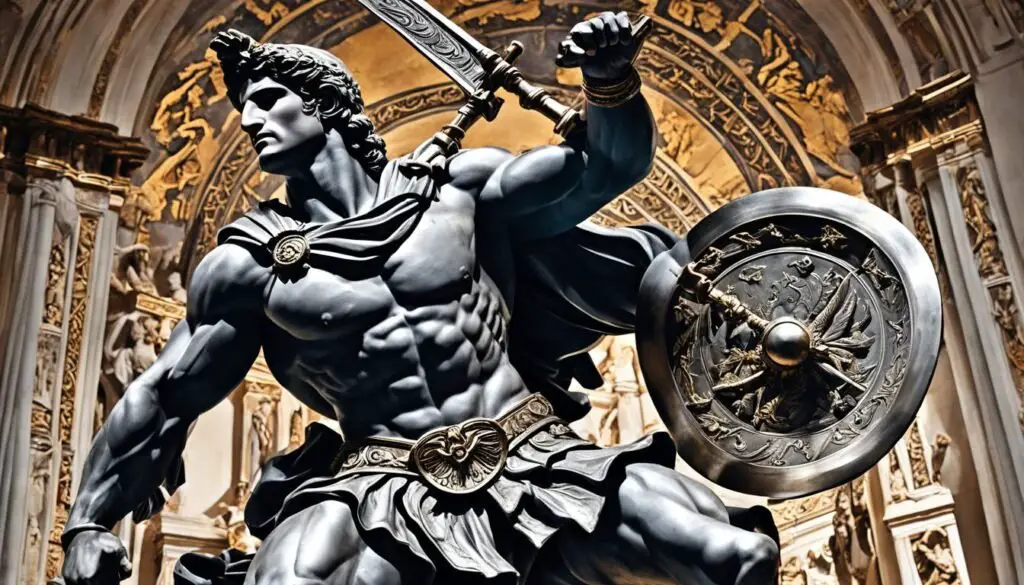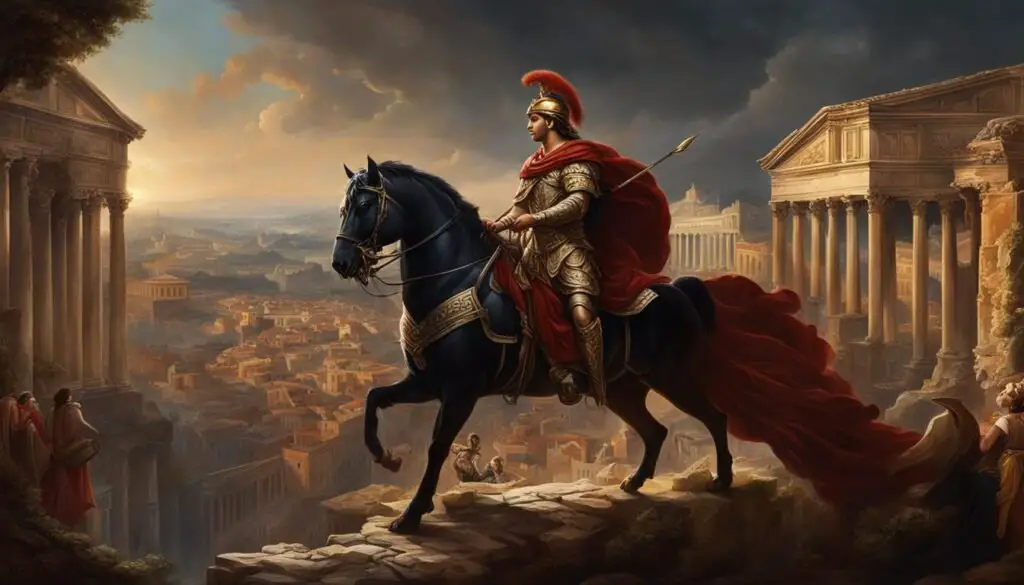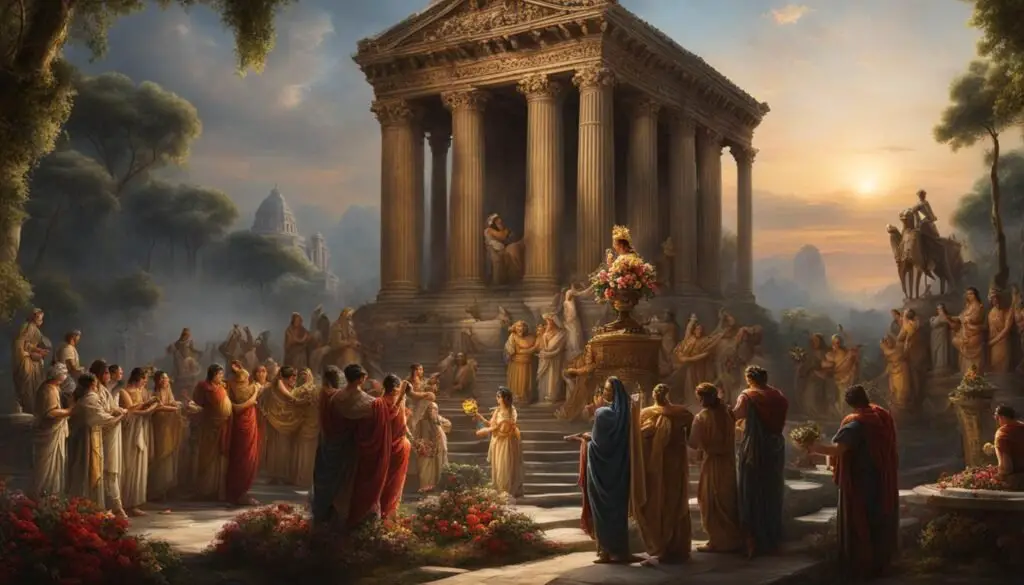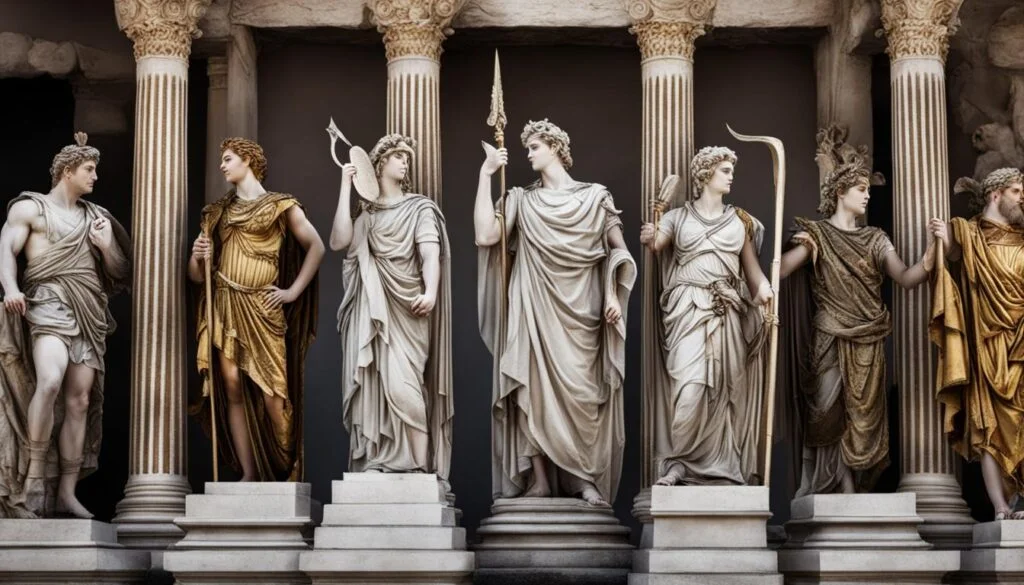Aeneas, a mythical hero of Troy and Rome, holds a significant place in Roman culture and mythology.
As the son of the goddess Aphrodite and Anchises, Aeneas played a crucial role in defending Troy during the Trojan War, surviving the conflict and its aftermath.
His story became intertwined with the founding of Rome, as Roman mythmakers used his figure to construct a mythical tradition connecting the origins of Rome with the heroic lineage of Aeneas.
Key Takeaways:
- Roman culture celebrates the legend of Aeneas, a mythical hero of Troy and Rome.
- Aeneas was an important figure in the Trojan War and the surviving leader of the Trojans.
- His association with the founding of Rome was propagated by Roman writers, further solidifying his role as a symbol of Roman history and greatness.
- Vergil’s epic poem, the Aeneid, played a significant role in shaping Aeneas’s legend in Roman mythology.
- The story of Aeneas highlights the mythical origins and virtues that the Romans admired and sought to embody.
Aeneas in Greek Mythology
In Greek mythology, Aeneas is a fascinating character who appears as a minor figure in Homer’s epic poem, the Iliad.
Known for his involvement in the legendary Trojan War, Aeneas fought valiantly alongside the Trojans and served as a loyal lieutenant to his second cousin, Hector, the prince of Troy.
Throughout the Iliad, Aeneas displayed great courage and bravery on the battlefield, earning the praise of both his comrades and the gods themselves.
He was especially favored by deities such as Aphrodite, the goddess of love, Apollo, the god of music and prophecy, and Poseidon, the god of the sea.
While Aeneas may have been a minor character in the Iliad, his contributions to the Trojan defense against the Greeks should not be overlooked.
His heroic actions demonstrated his strength of character and willingness to fight for his homeland.
Aeneas in Roman Mythology

In Roman mythology, Aeneas holds a central role as the legendary founder of the Romans.
This association between Aeneas and the establishment of Rome was popularized by prominent Roman writers, including Julius Caesar and Virgil.
Aeneas was believed to be an ancestor of Romulus and Remus, the legendary twins who founded Rome.
Virgil’s Aeneid, a renowned Latin epic poem, solidified Aeneas’s status as a hero of Rome and a symbol of Roman history and greatness.
The Aeneid vividly portrays Aeneas’s extraordinary journey from Troy to Italy, chronicling his struggles and triumphs along the way.
Through his efforts, Aeneas played a pivotal role in the establishment of the Roman people, shaping the destiny of Rome itself.
Aeneas’s Journey in the Aeneid

The Aeneid, an epic poem by Virgil, chronicles the remarkable journey of Aeneas from the ruins of Troy to his eventual arrival in Italy and the establishment of Lavinium, the precursor to Rome itself.
This captivating narrative takes readers on an adventure filled with trials, tribulations, and profound encounters that shape the destiny of Aeneas and his fellow Trojan survivors.
After the fall of Troy, Aeneas, as the leader of the Aeneads, bravely sets sail with his faithful companions in search of a new home.
Along the way, they face numerous challenges and obstacles that test their resolve and resilience.
One notable episode of Aeneas’s journey is his passionate love affair with Queen Dido of Carthage.
Their encounter in Carthage becomes an emotionally charged and heartfelt tale of love and duty.
As Aeneas continues his odyssey, he encounters powerful gods and goddesses who shape his path.
These divine interventions signal Aeneas’s destiny and underline his role as a chosen hero.
The journey takes him through Sicily, where the Trojans honor their fallen comrades, and eventually to the shores of Italy.
The crossing of the Tiber River marks a pivotal moment in Aeneas’s journey.
This event foreshadows his destiny as the founder of a new civilization, as he is greeted by the god Tiberinus, who guides him toward his ultimate destination.
Aeneas’s arduous voyage culminates in the establishment of Lavinium, where he marries Lavinia, the daughter of King Latinus, thus solidifying his ties to the land and its people.
The tale of Aeneas’s journey in the Aeneid is a testament to the resilience, determination, and unwavering spirit of the Trojan hero.
It highlights the challenges he faces, the relationships he forms, and his unwavering commitment to fulfilling his divine mission.
By following Aeneas’s extraordinary odyssey, readers are drawn into a timeless story of heroism and destiny, leaving an indelible mark on Roman culture and the significance of Aeneas as a legendary figure.
Aeneas’s Virtues and Moral Character

In Virgil’s epic poem, the Aeneid, Aeneas is portrayed as a paragon of virtue and moral character.
His exemplary qualities of piety, obedience to the gods, and heroism make him a beloved figure in Roman mythology and an exemplar of Roman values.
Aeneas’s piety is evident throughout his journey. He is deeply devoted to the gods and carries out their will with unwavering obedience.
This devotion is often depicted as an essential aspect of his character, emphasizing his strong sense of duty and respect for divine authority.
Furthermore, Aeneas displays remarkable heroism in the face of adversity. He remains resolute and steadfast, even in the most challenging circumstances.
His determination and courage inspire those around him and make him a true Trojan hero.
Whether facing trials or making difficult decisions, Aeneas consistently puts the welfare of his people and the fulfillment of their destiny above his desires.
He exhibits selflessness and self-sacrifice, embodying the noble qualities that the Romans treasured in their legendary heroes.
Aeneas’s Legacy in Roman Culture

Aeneas’s legend and his connection to the founding of Rome had a profound impact on Roman culture.
The Romans embraced the story of Aeneas as a way to link their history to the ancient Greek tradition of heroic epics and legendary heroes.
Aeneas’s descendants, Romulus and Remus, were believed to have founded Rome, ensuring its greatness and status as a world power.
The Romans revered Aeneas as a symbol of their cultural identity and ideals, finding inspiration in his legendary journey from the ruins of Troy to the establishment of Lavinium, the parent town of Rome.
By embracing Aeneas’s legacy, the Romans celebrated their connection to the heroic past and endorsed their claim to Roman greatness.
Aeneas provided a mythical lineage that reinforced the Romans’ sense of national pride, allowing them to view themselves as descendants of heroic figures and participants in a grand narrative of destiny.
Historical Accounts and Sources

The legend of Aeneas has been chronicled in various historical works and mythographic sources from ancient Rome.
These accounts provide valuable insights into the mythological figure and his significance in Roman culture.
Some prominent historical sources that mention Aeneas include:
- Cato the Elder’s Origines: Cato the Elder, a Roman statesman and historian, wrote “Origines.” In this work, he explored the origins and early history of Rome, which included references to Aeneas and his role in the founding of Rome.
. - Livy’s Ab Urbe Condita: Livy, a Roman historian, composed “Ab Urbe Condita” or “The History of Rome.” Livy’s work extensively covered the legendary founding of Rome and the role of Aeneas in this narrative, drawing from earlier sources and traditions.
. - Dionysius of Halicarnassus’s Roman Antiquities: Dionysius of Halicarnassus, a Greek historian, and scholar, wrote “Roman Antiquities.” In this extensive work, Dionysius explored the history of Rome and its mythical origins, relying on earlier Greek sources and incorporating them into the Roman narrative.
While these historical accounts laid the foundation for the understanding of Aeneas in Roman culture, it is Virgil’s masterpiece, The Aeneid, that had the most significant impact.
Virgil’s epic poem solidified Aeneas as a central figure in Roman mythology, showcasing his journey and the founding of Rome.
Aeneas in Art and Literature

The legend of Aeneas has served as a rich source of inspiration for artists and writers throughout history.
His epic journey encounters with various characters, and pivotal role in the founding of Rome have been captured in numerous artistic depictions and literary interpretations.
One of the most renowned works is The Aeneid, an epic poem by Virgil that has had a lasting impact on Western literature.
The Aeneid tells the story of Aeneas’s quest to establish a new homeland for the displaced Trojans after the fall of Troy.
This heroic narrative has captivated readers for centuries, fueling the imagination of writers and poets who have sought to recreate and reinterpret Aeneas’s legendary exploits.
The artistic representations of Aeneas’s story often portray key scenes from his journey, such as his escape from the burning city of Troy, his encounters with gods and goddesses, and his eventual arrival in Italy.
These visual depictions highlight Aeneas’s courage, resilience, and his role as a founding figure in Roman history.
In addition to the visual arts, Aeneas’s legend has also inspired a wide range of literary works.
Writers have explored different aspects of his character and his impact on the course of history.
Some authors have focused on Aeneas’s moral virtues, such as his piety and unwavering loyalty to the gods, while others have delved into the psychological and emotional dimensions of his journey.
Moreover, Aeneas’s story has been adapted and reimagined in various forms, including novels, plays, and even graphic novels.
These literary interpretations continue to bring Aeneas’s timeless tale to new audiences, ensuring that his legacy endures in the literary landscape.
Aeneas’s presence in both art and literature testifies to his enduring impact on artistic and creative expression.
His legendary journey, depicted in vivid visual imagery and conveyed through captivating narratives, continues to fascinate and inspire audiences across generations.
Aeneas’s Cultural Significance

Aeneas’s legend holds immense cultural significance in Roman identity and mythology.
As a national hero and a foundational figure in Roman history, Aeneas represents the heroic ideals and virtues that the Romans admired and sought to embody.
His epic journey from the fall of Troy to the founding of Rome symbolizes the resilience, endurance, and destiny of the Roman people.
Aeneas’s unwavering commitment to his mission and his unwavering loyalty to his family and gods exemplify the values that the Romans held dear.
In Roman mythology, Aeneas’s story serves as a reminder of the Romans’ legendary origins and their aspirations for greatness.
His epic journey and eventual establishment of Rome reinforce the collective consciousness of the Roman people, forging a sense of national identity and pride.
Aeneas’s cultural significance extends beyond mythology and literature. He is a symbol of Roman greatness and legacy, inspiring generations of Romans to strive for excellence and embody the ideals represented by their national hero.
Throughout Roman history, Aeneas’s legendary status influenced art, architecture, and public monuments.
His story became embedded in the fabric of Roman culture, transcending time and immortalizing his heroic achievements.
In conclusion, Aeneas’s cultural significance as a national hero and symbol of Roman identity is immeasurable.
His journey from Troy to the founding of Rome resonates as a testament to the enduring spirit and determination of the Roman people.
Aeneas’s legacy continues to inspire and shape the cultural heritage of Rome, solidifying his place in Roman mythology and the hearts of the Romans.
Aeneas’s Death and Worship as a Local God

Accounts of Aeneas’s death vary, but according to Dionysius of Halicarnassus, he fell in battle against the Rutuli, and his body was never found.
This mysterious disappearance led to his deification as a local god, known as Juppiter indiges.
This worship of Aeneas as Juppiter indiges further solidified his status as a legendary figure in Roman culture and mythology.
The reverence for Aeneas as a deity showcased the profound impact he had on the Roman people, who saw him as a symbol of bravery, heroism, and divine favor.
Conclusion
The legend of Aeneas in Roman culture has had a profound impact on shaping the Roman identity, mythology, and literature.
Aeneas’s journey, as portrayed in the epic poem Aeneid, serves as the foundation of Rome and represents the resilience and destiny of the Roman people.
Aeneas embodies the virtues of piety, heroism, and determination, making him a revered national hero and a symbol of Roman greatness.
Aeneas’s legacy continues to resonate through various forms of artistic expression, including art and literature.
Countless artists and writers have been inspired by his story, perpetuating his legend and ensuring its enduring presence in Roman society.
The Aeneid itself has become a masterpiece of Roman literature, shaping the perception of Aeneas and reinforcing his cultural significance.
Throughout history, Aeneas has remained a powerful figure in Roman culture, reminding the Romans of their legendary origins and their aspirations for greatness.
The legend of Aeneas has become an integral part of the Roman cultural heritage, leaving a lasting impact on the collective consciousness of the Roman people.
As a result, Aeneas’s legacy as a national hero and symbol of Roman culture continues to be celebrated and cherished to this day.
Frequently Asked Questions
What is the significance of Aeneas in Roman culture?
Aeneas is significant in Roman culture as the legendary ancestor of the Romans. He is the protagonist of Virgil’s epic poem, “The Aeneid,” which portrays his journey from Troy to Italy, where he becomes the forefather of the Roman people. Aeneas embodies the Roman virtues of duty, piety, and devotion to the gods.
What was Aeneas’s role in the Trojan War?
In the Trojan War, Aeneas was a Trojan hero and a defender of the city of Troy. Although he was not as prominent as Hector, he was one of the bravest warriors and a key leader in the defense against the Greek invaders.
What personal qualities was Aeneas known for?
Aeneas was known for his piety, sense of duty, and respect for the gods. He was also characterized by his bravery, leadership, and unwavering commitment to his divine mission to found a new city that would eventually become Rome.
Who does Aeneas represent?
Aeneas represents the ideal Roman virtues of duty, piety, and devotion to the gods and family. He symbolizes the Roman ideal of a hero who sacrifices personal desires for the greater good and the fulfillment of destiny.
What was Aeneas’s fatal flaw?
Aeneas’s fatal flaw, if any, could be seen as his overreliance on fate and the gods, sometimes leading to inaction or hesitation. His sense of duty and destiny often conflicts with personal desires, causing internal struggles.
What is Aeneas’s symbol?
Aeneas is often symbolized by the laurel tree, representing victory and honor. Additionally, his connection to the Trojan heritage and his role as a founder of the Roman people are significant symbols.
Which god hates Aeneas?
Juno, the Roman queen of the gods, harbored hatred towards Aeneas. She opposed his mission due to her grudge against the Trojans and her fear that Aeneas’s descendants would destroy her favorite city, Carthage.
What did Aeneas do wrong?
Aeneas’s perceived wrongdoings are often related to his personal sacrifices for his mission. His abandonment of Dido, the queen of Carthage, is a notable example. This act caused great sorrow and turmoil, illustrating the difficult choices he made to fulfill his destiny.
What was Aeneas suffering from?
Aeneas suffered from the burden of his destiny and the losses he endured along his journey. He faced the destruction of Troy, the loss of loved ones, and the emotional turmoil of leaving Dido. These sufferings highlight his resilience and commitment to his divine mission.




